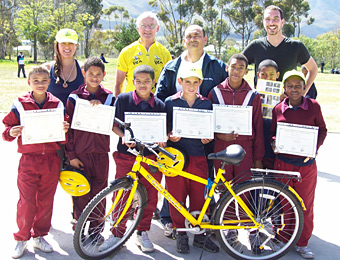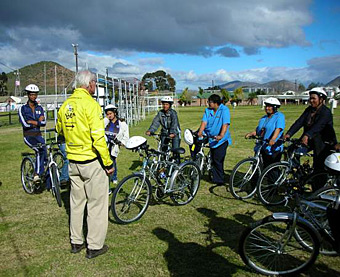Wheels of change in South Africa

CYCLING ADVOCATE: Louis de Waal (in yellow) and other BEN staffers with children who had just completed their bicycle safety course. De Waal cofounded BEN, the Bicycling Empowerment Network, in 2002 to improve mobility and alleviate poverty in South Africa. (Photo by Louis de Waal.)
More than 9 million South African children walk to school every day. Three million walk for more than an hour, and in the rural countryside, some walk more than four hours.
In those outlying areas, many adults work as farm laborers; to find employment they travel from farm to farm, trudging long distances. When families get sick, they rely on house calls from government health care workers, and the workers, too, must walk hours and hours to reach their patients.
“It’s madness,” says Louis de Waal (M.S.’72 CEE), who grew up in rural South Africa and spent his professional life designing and building thousands of kilometers of roads there, many of which opened up inaccessible places deep in the country’s interior.
Now retired, De Waal is on a mission to improve mobility for all South Africans, especially in rural areas. The goal, says the 73-year-old Cape Town resident, is to keep children in school and help adults reach work more easily, ultimately easing poverty and slowing the flood of people forced to move to urban areas for work.
But De Waal doesn’t want to add more vehicles to roadways, grow public transportation or launch more infrastructure projects. His answer is the bicycle.
“Riding a bicycle is four times faster than walking and three times more efficient,” the avid cyclist says. Bikes are cheap to operate and maintain, he adds. They improve one’s health and don’t burn fossil fuels or pollute the air.
Shortly before he retired in 2003, de Waal and a friend launched the nonprofit organization BEN, the Bicycling Empowerment Network. To date, BEN South Africa has imported more than 9,000 used bikes from donor organizations in Europe, Asia and the Americas. It fixes and distributes them at little or no cost to schoolchildren, farm workers, health care workers and others in need. When participants receive a bike, they also learn safe riding techniques and maintenance.
The benefits are enormous. Health care workers on BEN bikes, for example, now see 500 to 550 patients a month (and spend more time with them), compared with the 100 to 200 patients they were typically able to serve walking.

POWER OF THE PEDAL: De Waal (in yellow) instructs government health care workers about bicycle maintenance and safety. Workers who receive BEN bikes now visit up to 550 patients a month (and spend more time with them), compared with the 100 to 200 patients they previously served on foot. (Photo by Louis de Waal.)
BEN also trains unemployed adults as bike mechanics and teaches them basic business management skills. It equips them with shipping containers, bicycles and tools in order to set them up with a small shop. Twelve small businesses, or Bicycle Empowerment Centres, are now sprinkled throughout the Western Cape area and run independently of BEN.
The nonprofit also lobbies the government for infrastructure improvements, such as revised traffic laws and improved integration of bikes with public transportation. It advises government officials on biking benefits and programs as well as infrastructure design.
With its successful formula, BEN has grown beyond South Africa’s borders, with sister organizations established in Namibia in 2005 and Botswana in 2009.
“Louis’s work has been critical to the success of the organization,” says Andrew Wheeldon, BEN cofounder and managing director. “He has sound ideas about mobility and transport systems. He’s helped and given so much.”
De Waal biked all the time as a child, he says, but gradually stopped as rugby and other activities took precedence. At Berkeley in the early 1970s, de Waal observed professors riding to work. “My God,” he remembers thinking. “What’s wrong with me?”
Impressed with Cal’s cycling fervor, de Waal began riding again and wrote his master’s thesis on bicycling facilities, bringing a renewed cycling commitment back to South Africa with him. (Cal’s own bike culture got a recent boost with the opening of BicyCAL, a student cooperative that teaches bike maintenance in Sproul Plaza.)
De Waal also started BEN as one small, but powerful way to help reduce the inequity and poverty that resulted from the apartheid era, South Africa’s legal racial segregation in effect from 1948 to 1994.
“There were many South Africans like me who never believed in apartheid,” De Waal explains. The civil engineer and his wife actively campaigned against it, and twice de Waal had to bail her out of jail. By running BEN, de Waal and seven staff members chip away at apartheid’s legacy.
Recently, de Waal and BEN staffers selected and trained 151 children from rural, disadvantaged backgrounds to participate in the Cape Argus Pick n Pay Cycle Tour, a 109-kilometer (68-mile) competitive race around Cape Town. As many as 35,000 cyclists participate, making it the world’s largest individually timed cycling race. For many of the young cyclists, it was their first visit to Cape Town.
“Their sense of achievement was amazing,” de Waal says. “For days, they wouldn’t talk about anything else. It felt great. It felt like, ‘Hell, we’ve done something here.’”
